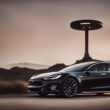The EU has an exit date from the internal combustion engine set. The schedule is not too ambitious in comparison with the announcements made by the manufacturers, the change could be made E-mobility but still accelerate strongly.
The EU plans to ban the internal combustion engine from 2035. Then there should be no CO27-emitting in the area of the 2 member states New cars with diesel, Petrol- or Hybrid drive more can be sold, as can be seen from the “Fit for 55” future program that has now been presented.
In contrast to what is customary in such cases, the policy proposal for a ban should not cause great resistance among car manufacturers this time. Many of them had already announced their departure from the internal combustion engine in the past few months. Volkswagen names 2035 as the latest exit date, Fiat and Ford want to be so far at the latest by 2030 and Daimler is also apparently planning to bring forward the deadline originally set for 2039. Opel has just announced that it intends to become a pure e-brand as early as 2028. The list goes on; Volvo, Jaguar and Mini also have an official expiry date on their combustion engines.
There is a lack of charging facilities outside of Europe
However, the announcements usually only apply to Europe. In other parts of the world, volume manufacturers in particular are planning to continue using internal combustion engine cars. On the one hand, because the charging infrastructure is missing in many places. But also because the production capacities for electric cars and batteries tend to be scarce. According to a Greenpeace study, Volkswagen alone will lack up to 2030 million cars in 2,7 to meet global demand for electric vehicles. In this context, the environmentalists criticize the group's adherence to its internal combustion engines. Even for the northern Germans, who are particularly ambitious in the sector comparison, there should be no alternative to this. For other manufacturers, the supply situation could look even worse.
But the ban on combustion engines is also a challenge in Europe itself. While the electric car is conquering ever higher market shares in rich countries, it hardly plays a role in the poorer EU countries, as data from the manufacturers' association ACEA shows. According to this, 73 percent of all new e-cars are sold in the four states of Sweden, the Netherlands, Finland and Denmark - all countries with a gross domestic product above 46.000 euros per capita. However, the costs for electric vehicles are likely to fall in the coming years; experts estimate that they could be at the level of combustion engines by the middle of the decade. The cost advantage in operation will also increase permanently in perspective. Fuel prices and CO2 taxes will potentially make combustion-powered cars uneconomical faster than a government ban would take effect.
Work still needs to be done on the electricity
In large parts of Europe, however, there is still a lack of the right charging infrastructure. The five EU countries with the lowest vehicle quota each only have around 1 percent of the charging stations on the continent. In addition, in many places the current electricity mix is not suitable for operating e-cars in a particularly climate-friendly manner.
As great as the difficulties are, for some experts and environmentalists the EU's plans are not going fast enough. Because even after the registration ban, millions of diesel and gasoline engines will continue to drive on Europe's roads for many years to come. Scientists at the Swedish Chalmers University recently suggested bringing the combustion ban in their country forward from 2030 to 2025 in order to counteract this fleet effect. This is the only way to achieve climate neutrality, as planned there, by 2045, because a combustion ban would only take full effect after 20 years. The EU wants to achieve a net zero in CO2050 emissions by 2.
Last but not least, a combustion ban announced at an early stage also has a symbolic function. Many consumers would probably consider switching to the electric car earlier just because of the announcement in order to forestall a loss in value of their old cars with internal combustion engines on the used car market. Buying a non-electric new car would not only be increasingly unattractive on the date of the ban, which could accelerate the transition to e-mobility.




